
By Javacia Harris Bowser | For The Birmingham Times
For the past several years the body positivity movement has pushed back against the notion that the only way to be healthy or to be beautiful is to be thin. Thanks to the work of activists, artists, scholars and social media influencers, American culture has seen more body diversity in advertising and media, larger size ranges for clothing, and an overall push for body acceptance.
Then a new class of weight loss drugs, called GLP-1s, entered the chat and the conversation shifted. As celebrities and everyday people began to drop pounds more easily, body positivity seemed to have dropped from the spotlight.
But for some Birmingham-based fashion and beauty influencers body positivity has never been a trending topic. It’s a way of life.
What is body positivity?
Today’s body positivity movement grew out of the 1960s fat-activism movement, which advocated for people who were deemed overweight to receive the same rights and treatment — especially medical treatment — as thin people. The fat-activism movement also urged women to stop endless cycles of dieting.
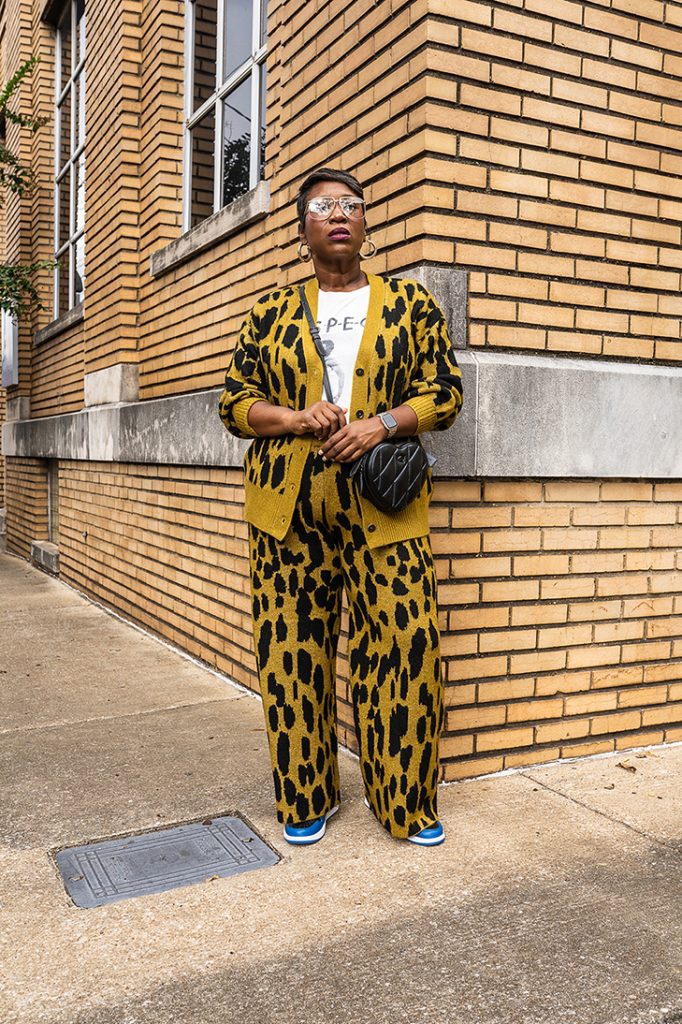 Birmingham-based veteran plus-size fashion blogger Jeniese Hosey. (Isaac Nunn at Suburban Creative)
Birmingham-based veteran plus-size fashion blogger Jeniese Hosey. (Isaac Nunn at Suburban Creative)Decades later as fat activism moved online, #bodypositivity was born, focusing not only on fat acceptance but also the idea that all bodies deserve acceptance and that it’s possible to be healthy at any size.
Asked how she defines body positivity, the Birmingham-based veteran plus-size fashion blogger Jeniese Hosey said, “For me, it’s almost like body neutrality.”
Hosey, who can be found online @jenesaisquoithe added, “Body positivity means that there are no good and bad bodies. It means that everybody, no matter their size, skin color, height, weight — any of that — deserves all equal treatment. Everybody deserves the same privileges, no matter any of that. It’s also knowing that you have the right to feel good in your skin, no matter what that looks like for you.”
Body neutrality has built buzz in recent years too. According to the Cleveland Clinic, the term “body neutrality” began to surface online around 2015 and started to get more attention around 2019 once celebrities began to mention the concept.
Here’s an example of how body neutrality works: A person looks at her stomach and she’s not checking for belly bulge or for six-pack abs. She simply acknowledges and appreciates her stomach’s ability to digest food and give her energy for the day.
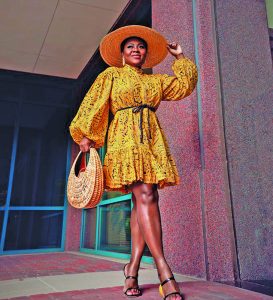 Birmingham influencer Funmi Ford. (Provided)
Birmingham influencer Funmi Ford. (Provided)“I see it as a pathway to body positivity,” said local influencer Funmi Ford. People who have trouble loving or being positive about their bodies, can simply be grateful that their bodies are function, explained Ford, who can be found online @funmiford.
Birmingham-based plus-size fashion blogger Christena Williams said she was neutral about her body until she began to post fashion photos of herself on social media, who can be found on Instagram and TikTok @ChristenaMelea.
“I think it made me hyper aware of how other people saw my body,” she said. The recent wave of weight loss drugs has kicked this awareness into overdrive for Williams and she believes these drugs are forcing body positive content creators to ask themselves tough questions.
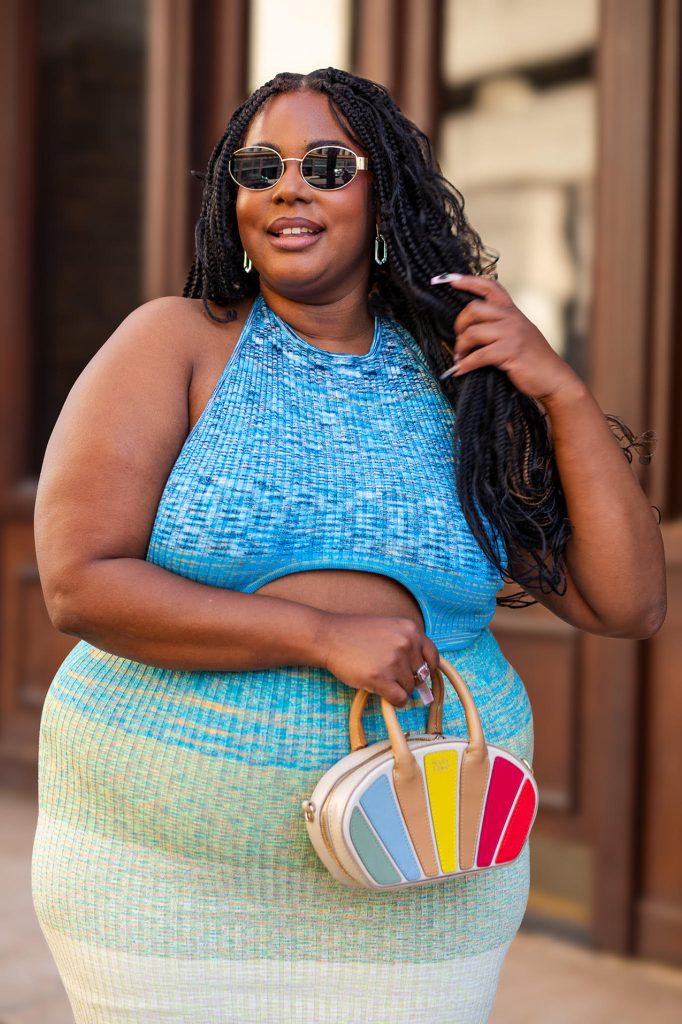 Birmingham-based plus-size fashion blogger Christena Williams. (Martin Lungu of Timeless Imagery).
Birmingham-based plus-size fashion blogger Christena Williams. (Martin Lungu of Timeless Imagery).“It turned our space into this confusing sphere,” she said. “There’s this thing that we can take, and we can actually be small. But then it made you confront the question of ‘Does that mean I don’t like my body?’”
Body Positivity and Weight Loss
What does it mean when a body positive influencer loses weight? Is she still body positive?
According to Hosey, it depends.
“For me, part of body neutrality is you get to do what you want with your body,” she said. In other words, she has no problem with a body positive influencer choosing to lose weight. “Where I think some of the problems have come in is that there are people who have lost weight and then started speaking down on the plus size industry and plus size women.”
She’s also seen companies and brands ditch their plus-size lines too.
“It adds into the feeling that we were just like a diversity inclusion market that’s being left behind again,” she added.
Hosey believes influencers who’ve become critical of the same plus-size communities they once uplifted have not been honest about why they’re losing weight or how they truly feel about themselves, and they lash out at other people, she said.
“You were never happy,” she said to those creators who once promoted body positivity but now – after using weight loss drugs – engage in fat shaming. “You were grifting. You were just lying to make money.”
In the past few years, Hosey has dropped several clothing sizes, transitioning from a size 22/24 to 14/16. Hosey, who has Type II diabetes, attributes the weight loss to changes to her diet that she made because of complications she was having with diabetes.
Yet she still proudly identifies as plus-size and as body positive.
“I’ve lost weight, but I’ve also not made a big deal about my weight,” she said. “I’m never going to do a before and after post because I was fine either way. There’s never a reason for me to speak down on my size 22/24 self. She served me a great purpose. She was good to me. I loved the way she dressed, and she was happy.”
Social Media and Self-Esteem
Though some studies have found that social media can have a negative impact on body image – especially for young people – other research shows that some social media content can boost self-esteem.
“It definitely has its ups and downs, but for the most part, it has definitely improved my image and my feelings with my body,” Hosey said when asked about social media’s impact on her self-esteem.
Yes, she’s often showered with compliments when she posts photos of herself serving fierce and fashionable looks, but that alone is not how social media has helped her. Her confidence has been cultivated by the community of other plus-size fashion bloggers she’s found online.
“The plus-size community, for sure, made me a better person,” she said. “I’ve learned so much from other women. I’ve learned how to care for myself, how to put myself first, how to know that I am deserving of all the good things — love and positivity and good fashion and comfortable travel — no matter what my body looks like.”
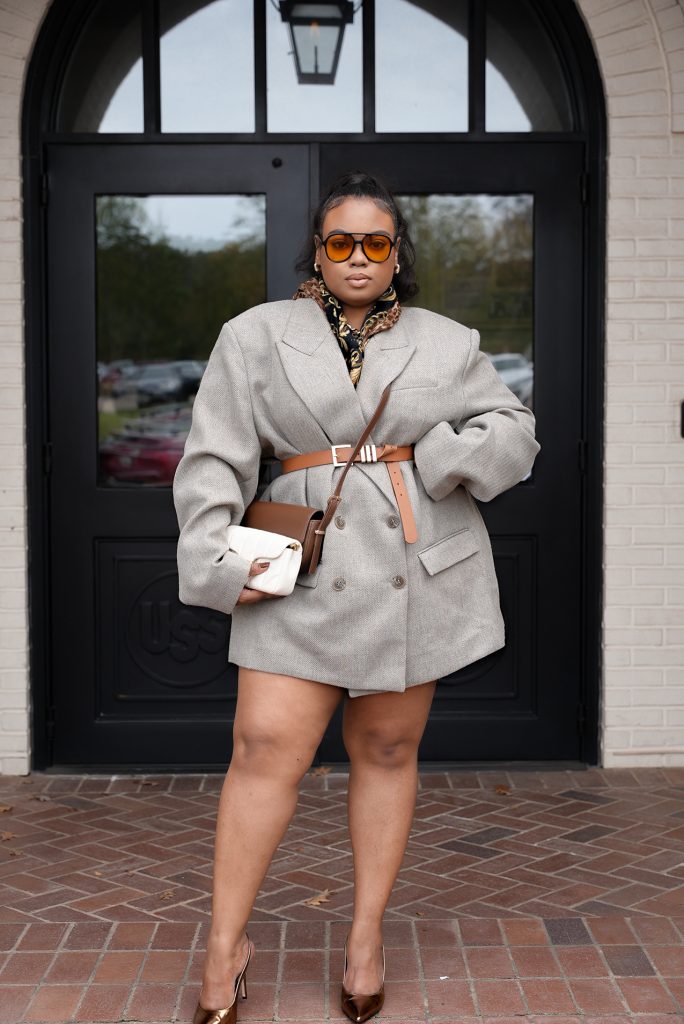 Aliscia Gilmore. (Provided)
Aliscia Gilmore. (Provided)Community has been key for Ford, too. When she does face negative comments online, she turns to friends who are also content creators for encouragement and support.
“When you get on social media and you don’t come in that package that people expect –you’re a little bit heavier, you’re a lot heavier, you’re shorter – you have to have a good support system and you have to get to a place where you are mentally strong,” Ford said.
Aliscia Gilmore who can be found online @Aliscia.Marie, says social media forced her to be stronger.
“Being in this industry has built a level of confidence that I have not always had,” she said. “I have had to find new ways to love myself. I had to find new ways to embrace who I am, this body that I have, and know that it’s okay for me to show up and still want to show off outfits, even after I’ve gained 20 pounds.”
Do It Fat
To some, body acceptance may seem like a superficial matter. But Birmingham-based makeup artist and beauty influencer Precious Sanders believes worries about weight can stifle creativity and even community impact.
She shared that her insecurities about her body once kept her from doing a host of things from trying a new haircut to showing up online to promote her makeup artistry business.
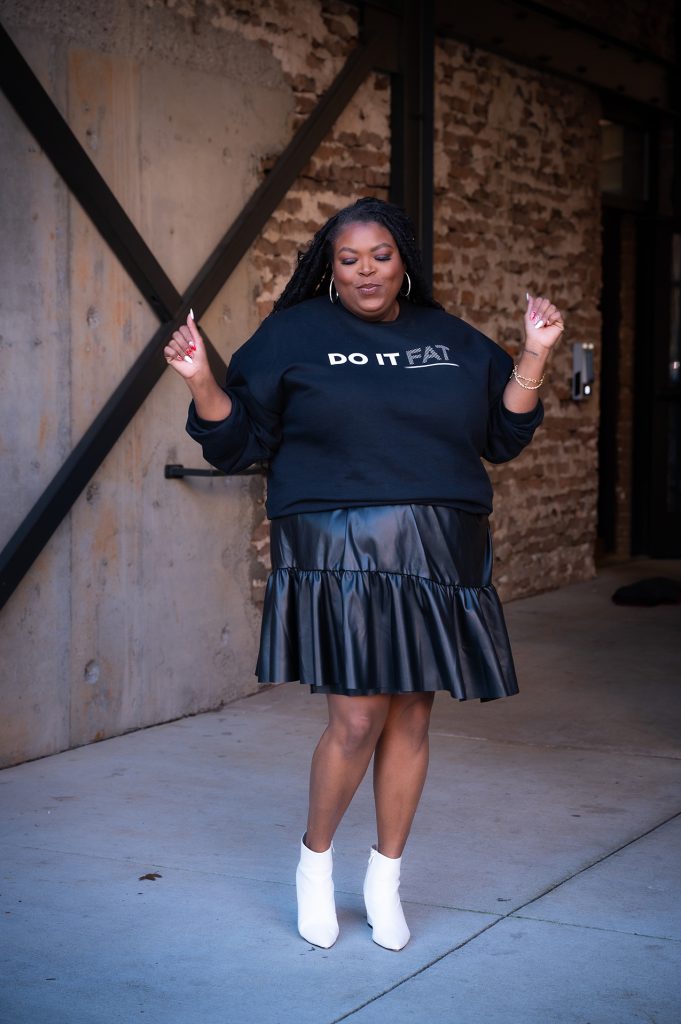 Birmingham-based makeup artist and beauty influencer Precious Sanders. (Melissa Newton)
Birmingham-based makeup artist and beauty influencer Precious Sanders. (Melissa Newton)“All I would see was the round face,” she said. “I have been plus-size my whole life. So you grow up being shy about public speaking and even being called on in class because kids are cruel and they’ll find the smallest ways to make you feel bad about yourself.”
But eventually, Sanders, who can be found online @iam.precioussanders, had had enough of hiding in the shadows.
“I got to the point where I was tired of suppressing my creativity,” she said. “I also realized that when the spotlight was put on me, I shined and I kind of like shining a little bit! And I felt like I had something to say.”
That’s why she launched Do It Fat – a podcast and product line meant to encourage people to follow the old adage of “feel the fear and do it anyway.”
“We all have what I consider a ‘fat’” she said. “It’s not just do it fat, but do it broke. Do it single. We all have that thing that holds us back. At the end of the day, you owe it to yourself because we don’t get more time.”
Learning to Love Self
For Gilmore, the new wave of weight loss drugs has had no impact on her sense of self.
“I would not be able to get out of bed every day if I woke up wondering what everybody else was doing, if they were losing weight, if they were gaining weight, if they were making more money,” she said. “I would not be able to get through a day if I was focused on the world in that way.”
Practicing affirming self-talk is one of Gilmore’s top recommendations for anyone pursing body positivity.
“If you wake up telling yourself that you love yourself every day, you’re eventually going to feel that,” she said.
Williams and Ford also both recommend therapy for working through past trauma that can impact body image.
For Williams and many other fashion influencers, a nice outfit is like a coat of armor, protecting them from the arrows of negative comments from others and negative self-talk.
But Ford believes the strongest shield comes from within.
“You can’t take away anything you didn’t build,” that’s her message to anyone trying to pierce her armor of self-love.
“Sit with yourself and learn to accept you as you are because when you go out into the world, other people will come and try to tell you who you are, try to tell you what you can do, what you can’t do because of how you look,” she said. “Take time to build yourself in secret and then when you go out in the public, you’re a united front with yourself and nobody can tear you down.”

 20 hours ago
1
20 hours ago
1
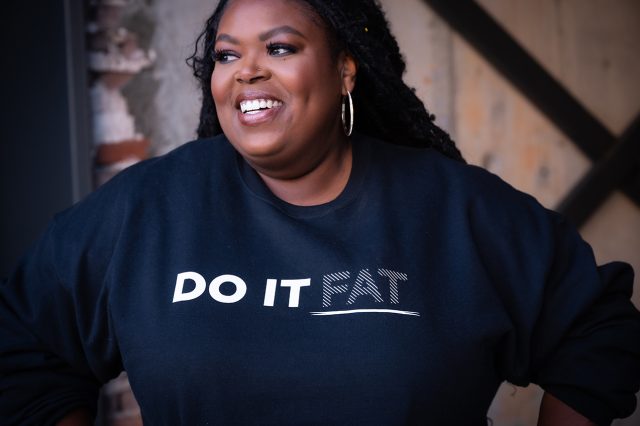









 English (US)
English (US)